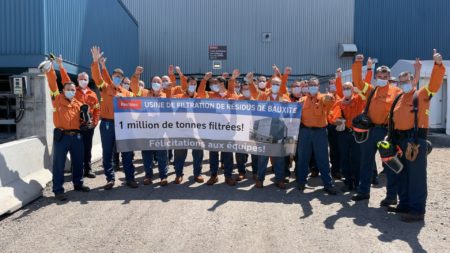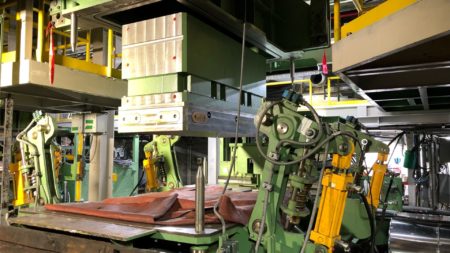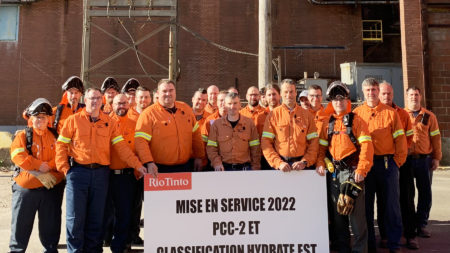The Bauxite Residue Filtration Plant Reaches the One-Million-Tonne Milestone

The filtering of one million tonnes of residue at the bauxite residue filtration plant is a major achievement for Vaudreuil Works and guarantees its long-term sustainability. The industrial filtration system in place is the most environmentally responsible bauxite residue dewatering technology in the aluminium industry. Now that this important milestone has been reached, the teams are continuing to target new heights, despite the difficulties experienced at the start of the project.
The purpose of the bauxite residue filtration plant, built in 2019, is to dewater mud, as opposed to letting it build up in the bauxite residue disposal site and waiting for it to settle. Bernard St-Gelais, Startup Leader, explained that, without this solution, Vaudreuil Works wouldn’t have been able to continue its activities, namely, transforming bauxite into alumina to supply the aluminium smelters.
He explained, “When bauxite arrives at Vaudreuil Works, it is crushed and undergoes a process through which alumina is extracted. After the alumina is extracted, a residue remains. This residue is washed in a series of thickeners and comes out as a somewhat liquid paste. Previously, this paste was deposited at the disposal site, where it was partially dried through a mud farming process. As the site was going to reach full capacity in 2022, we had to find a way to dry the mud, or else we wouldn’t have enough space to dispose of it.”
The bauxite residue filtration plant dewatered the mud using filter presses and plates. There are 71 plates per filter, and each plate weighs 375 kg. The mud is injected between the plates, and once it fills the plates, air pressure pushes the water out. Once the water has been drawn out, the filter is opened, and the dry mud is removed. It is then transported to the residue site.
This new state-of-the-art technology presents many advantages, including lower environmental risks, the gradual rehabilitation of sites and a significant reduction in the space required to store bauxite residue. This amounts to considerable gains for the environment. Moreover, since the residue is more solid, reclamation projects are easier to carry out.
According to St.-Gelais, because of the complexity of the process, it was difficult to get the project started. In October 2020, he was tasked with assembling a team to support the industrial filtration startup, which represents the most environmentally friendly bauxite residue dewatering technology in the aluminium industry.
He added, “It’s very much to the credit of the team in place that they were able to operate the filtration plant and ensure that Vaudreuil Works continues its regular operations. The hard work of the startup operation team, combined with that of the support team, allowed us to reach the mark of one million tonnes in just under six months. The plan was followed from start to finish.


